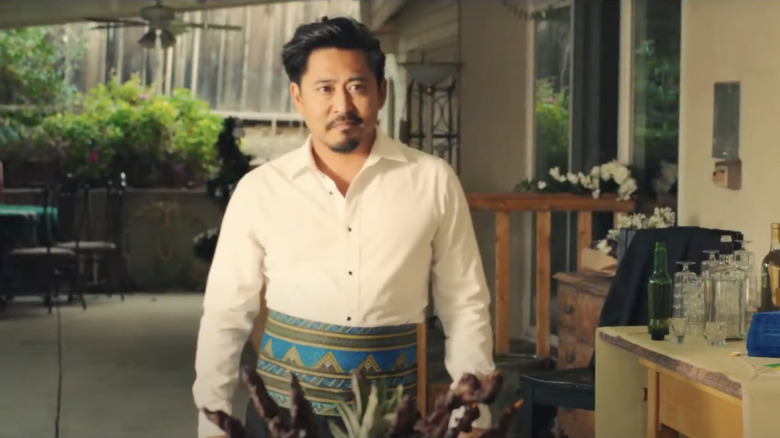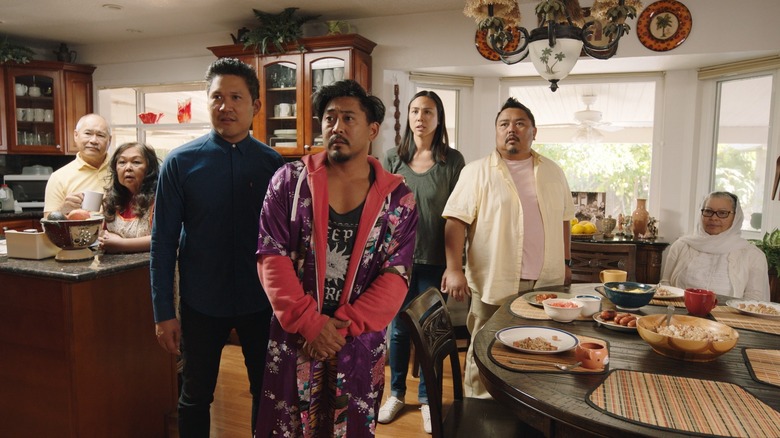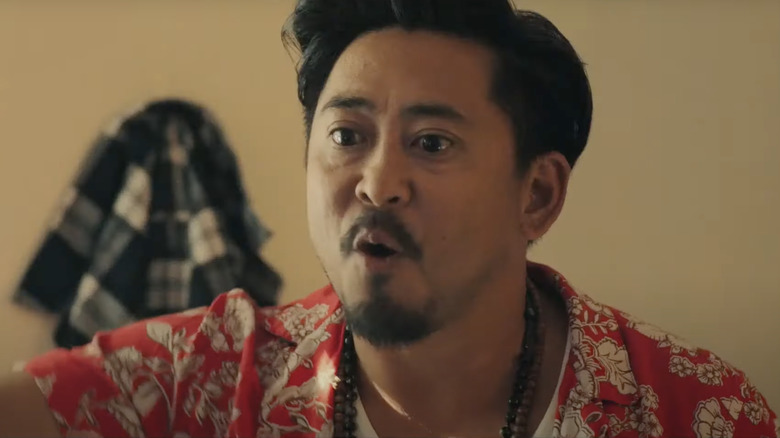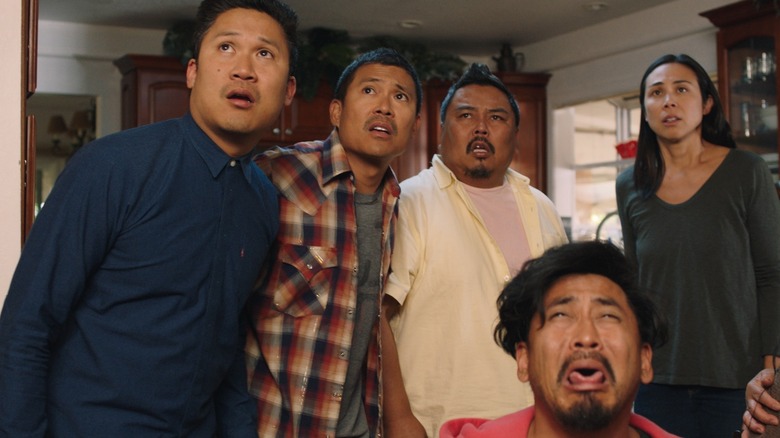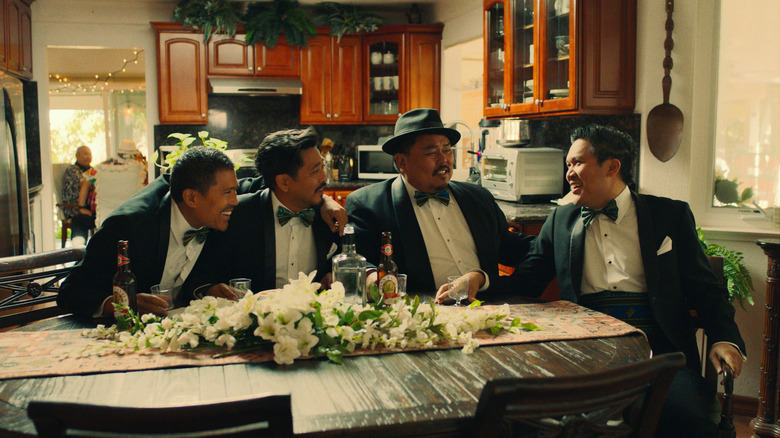The Fabulous Filipino Brothers' Dion Basco On His Appetite For Comedy And Getting White Hollywood's Attention [Interview]
Being the comedic relief is a very important role in entertainment and in life. After all, could you imagine going a whole day without laughing? It's not a great way to live. However, being funny can be serious business. "City Guys" star Dionysio Basco knows that all too well — his career is filled with funny roles. But that famous quote from Mark Twain about humor being the good-natured side of truth can apply to his work as well, and it especially applies in his latest film, "The Fabulous Filipino Brothers."
Separated into four vignettes, the new movie tells the story of four brothers confronting their issues with love, family, and culture ahead of a highly controversial Filipino wedding. Basco stars alongside his real-life brothers in the film, and his section definitely tackles the more wacky elements of love. But in another scene, his character, David, is the one dropping truth bombs about life and love when no one else is.
I recently had the chance to talk to Dion about that dichotomy by digging into some real food for thought via his food-centric scene in the movie. We also discuss the historical significance of his old NBC sitcom, being around our big Filipino families, and how meaningful it can be to break away from the typical formula of White Hollywood.
Man vs. Food
Dion, your vignette in the film was straight up funny as sh*t.
Thank you!
I was laughing out loud when I was watching the screener, but oddly, it gave me some cravings for longanisa.
[Laughs] It should, it should. I hope it does — and other things. When we're screening the film, I often go into the theater and watch people's reactions because we got a mix of people. Some young kids to old lolos and lolas [Tagalog for "grandpas and grandmas"]. Everybody's falling out of their chairs laughing, and it's a great feeling to write something like that and then actually shoot it and then have it actually comes across.
What was it like for you and your scene partner, Crystal Kwan, as you filmed this scene?
We had done something like this before in an acting class, so I rewrote it to fit this movie. I just knew that we had such great rapport that she had to be the actress [for this scene].
Since you've done it before, I guess that really helped with keeping a straight face while doing everything, right?
Yeah, it was actually a trip because we shot this on Halloween in 2019. The day of Halloween. People came to the set dressed up. Our DP was behind the camera in a banana costume. The first AC was dressed as me for Halloween. Or my character [David from "The Fabulous Filipino Brothers"]. And when there were kids around, after the first take, the parents took the kids away [because] it was crazy. It was one whole day of shooting for that scene.
You must have gone through so much food.
Yeah, I didn't eat lunch. I'll tell you that much.
"Peacemaker" star John Cena famously had to eat 36 empanadas while filming "The Suicide Squad" because he ate some in one take, so he had to keep eating them for continuity. How many takes did it take for you to get exactly what the director/your brother Dante was looking for in the scene?
I believe we did her coverage first, so it was all her. Then we did the scripted stuff, and then there was so much more food, so we kept doing it. "Pick up something else, keep doing that." Then it flipped around to me and we did the same thing. We ate a lot. There wasn't a lot of spit takes because the camera was just rolling, but I knew we were going to cut back and forth.
We ate a lot for sure, but it was fun. Out of the corner of my eye, people behind video village were all watching it and just cracking up. I could hear them. It was hard to keep a straight face, but me and Crystal were so locked into each other that we were there for each other and it worked out.
When I had a very, very brief stint in acting, I had to do the John Belushi thing from "Animal House" with the Jack Daniels, but I did it with iced tea. I haven't had ice tea since then. Was there a food item that you had to take a break from after shooting?
[Laughs] No. I don't really eat chicken feet a lot. It's not one of my go-to things, but I haven't had chicken feet since. I've had everything else since. Siopao, lechon, adobo.
Now I'm just thinking of the siopao part from the scene!
Oh, it was way more intense! There was a lot. I saw a first cut of the scene and I loved it. I wanted to go more, but then they actually dialed it back a little bit just so it could be consumed by everybody. We didn't go as crazy as we could have.
I see what you did there! "Consumed."
[Laughs]
Family Matters
Your character, David, is almost the emotional center of the family and the movie in many ways.
That's what I said!
If it wasn't for him, things wouldn't have played out the way they did in the end.
I agree for sure.
Why do you think families don't take the goofiest member very seriously, even in situations where they should be taken that way?
We wrote the character of David based off my life. We took very similar attributes. I'm a Burner. I go to Burning Man. I've only gone twice, but I'll claim I'm a Burner because I left the piece of my heart and soul on the playa and I need to go pick it back up and revisit it. I look at life very optimistically.
With this character, he also does the same. I don't know, even in my family dynamic outside of the movie, if anybody takes me seriously either. But I am dropping some knowledge because I really don't take everything too seriously. I think for people who overthink things and are very, very emotional about things, it seems too much of a risk to live that way. To live freer and let the wind blow you wherever it wants to blow you and then learn something from that. Maybe it's a mistake, but you learn from it, you grow from it.
In the scene with Danny Boy [played by Darion Basco], I thought it was very important for [David] to give them that. When you have somebody in your family who's a jokester, you automatically don't take them seriously, so you're having fun. You go into any conversation with them having fun. If they could drop some knowledge on you, I feel it's going to hit you a little bit more because we're not hitting you over the head with it. We're not forcing like, "You got to be this way, you got to be this way." It's just showing them what they can be. Saying yes can open up opportunities you wouldn't believe.
Since David shares so many characteristics with you, do you have a similar relationship with your Kuya, Derek, the same way Dayo and David were at odds once Danny Boy and Theresa came down the stairs after their first date?
No, I wouldn't say that. We don't really fight like that anymore. [Laughs] Nothing gets physical anymore. We're grown people. I think all the siblings have a pretty good relationship now and we're able to speak our mind without being too defensive or anything. But I think Kuya D could still get me. I think he could still beat me up, but I would run away. Same thing in the movie, he wouldn't catch me.
Another great thing about David is that comedy is often where the truth is really hidden. There are a lot of really great moments in this movie that are shocking in a funny way. But then this kind of subverts your expectations to where David is being shocking by bringing the heat and dropping the knowledge.
Thank you so much for noticing that. That comes up in the Q&A sometimes. Everybody wants to get deep in their feelings, but when it comes down to it, you do need somebody to just unlock the door for you sometimes. It could come from the most unexpected places.
Full House
We've talked a lot about your brothers and how you've worked with them throughout your career, but the credits of "The Fabulous Filipino Brothers" are teeming with Bascos. How many family members actually came together to create this movie with all of you?
[It started with] Dante and Darion writing the first draft and the outlines and everything, then me and Ariana coming in to punch up the jokes. I wrote my scene. Even in the outline, it was three or four pages of everybody's vignettes, then it was two lines: "Dion's going to write something here. Don't worry. It's going to be great." And people bought the outline off of that!
But not only that, our parents played our parents. We really wanted them to be in there. We're like, "Who's going to be our parents? Let's just have them do it!" But also our aunts and uncles were the small bit roles. Every Basco brother that we're named after, because we're named after our dad's siblings and my dad, were all in the movie somewhere. Our cousins are playing the music. They're the band in the Fil-Am [the Filipino American community center] and they actually wrote those songs. There's tons of Bascos. And other last names! All the last names in the credits are people that we grew up with in Pittsburg, California. They all came out and represented and supported.
That's so sick. One of the best things about being Filipino is the big family feel and the big gatherings. For all of them to come together on set like that, it must have been having a big Filipino party on set all the time.
Absolutely. And because it was the end of 2019, it was the last time we actually got together. Because of the pandemic, I look back and I even cherish it more. Every year we do an annual family gathering. We're usually doing a camping thing or something like that so that people from up north will come and meet the people from the south and we'll meet in the middle. We haven't been able to do that for a few years, so it was one of our last family parties.
Every night after work, my Auntie Pinky — who's actually the other woman in my scene who tells me, "Don't touch the food" — we would go to her house and she would cook dinner for us every night. We would all just decompress as a cast and a crew. Then the core group of the family members and my parents, we would go off and rehearse drunk and get ready to go. It was a whole family feel the whole time.
That made me really happy, but also slightly sad because I missed that type of stuff in the pandemic era. We had to cancel a couple of really big Filipino weddings in my family because of the pandemic.
It happens. We're going to get through it. This will pass and we'll look back on this as a crazy-ass time. But yeah, family is a really big, integral part of the movie and it's one of the main themes. Having your siblings' back and getting them through whatever they're going through.
A Different World
Filipinos and Filipino Americans have been hustling in Hollywood since the very beginning. But other than Lou Diamond Phillips and Ernie Reyes Jr., Filipinos never really got a chance to shine properly until "Crazy Ex-Girlfriend" or "Superstore" or the Marvel Studios Spider-Man movies. But before all that, there was you as Alberto Ramos on "City Guys."
Yeah! Yeah, absolutely. I loved that show.
I look back on it fondly because I didn't give a sh*t about "Friends" and I wanted to find other sitcoms to relate to. For me, it was "City Guys" and "The Wayans Bros."
Right on. Thank you.
It just meant a lot to me to see another Filipino in Hollywood. But I'm curious because I don't remember if they ever explicitly said so: Was Al meant to be Filipino or was he written as a Hispanic character?
When I first auditioned for the role, it was New York so they wanted a New York Puerto Rican. Then I went in to audition and got the job. One of the executive producers was walking around the set one day and he was just showing me everything. "Hey, this is the school set, this is this, this is that." Then he's like, "Hey, so what are you? We know you're not Puerto Rican." Yeah, no, I'm Filipino. He's like, "Filipino. Okay, cool." That was the end of that conversation.
In the first season, while I was building the character of Rocket Ramos, because I was a bike messenger, they wanted me to be an all this racing-type gear. I was like, "Hmm, I don't know. I don't know if I'm going to be wearing spandex every show." I was into hip-hop, so I started wearing baggy clothes. But then I had a friend who had this company called Tribal Pinoy. If you watch the first couple of episodes, I'm rocking a Tribal Pinoy bag and it has the Filipino sun on it.
As it progressed, we never talked about what I was. But I asked the producers, "Hey, can I represent Filipinos? Can we say that I'm Filipino? I don't care if you say it as a joke or whatever. I just want people to know that Al is a Filipino." They said we can't do it. [When I asked why, it was] because we were getting fan mailed from everybody saying thank you for having a Korean on the show. Thank you for having a Columbian on the show. I was just the ethnically ambiguous dude that was representing a lot of cultures. They wouldn't allow me to represent my own, but I represented a lot [of cultures] and a lot of people liked it. They wrote into the shows saying, "Thank you for having me on the show!" Everybody was claiming me, which is cool because we're all mixed up. We have blood from a lot of areas of the world, so that was cool.
I did a family episode. If you notice in that family episode, my six brothers and sisters were all Filipino. And then my parents were Mexican. You know, it's Hollywood, so I don't know how that got there. My nephew played my little brother on the show one time. DJ Basco. I got my Filipino family in there every once in a while.
Growing Pains
Did you ever feel any pressure from being claimed by so many different communities? It must be hard sometimes to think about being a representative of the Filipino community, but for you on "City Guys," you were representing all of those people that wrote in.
No, I never felt the pressure. I feel, looking back on it, I was doing something right. Because if you see a character on something and you don't like that character and they don't specifically say that's a Filipino guy or whatever and you don't like that character, you could easily be like, "He ain't Filipino." But if so many people are claiming you, that means I was doing a good job somehow, some way.
I'll give you a little nugget about that, too. I was walking around with an NBC executive at the time. He said, "Do you realize that you're the first Asian series regular who gets to kiss a white series regular on network television?" I was like, "WHAT?!" When I got together with my girlfriend on the show, that was the first time an Asian man had ever kissed a white lead on the show. On ANY network show.
That's so wild because I thought that might have been true because I had never seen it happen back in the day. But to get this confirmation is wild!
Yeah, it's pretty wild. I think back to it now and that's crazy. That's pretty, pretty dope. It's pretty epic.
Man, I've always known you and your brothers to be trailblazers, but being history makers like that is pretty freaking cool.
It is. It is pretty freaking cool. What sucks though is that was in the '90s or the 2000s. Why did it take so long for that to happen?
Exactly! Shows back then were all set in major metropolitan cities like Boston, New York City, and Los Angeles, yet there weren't any Asian characters in their casts. It was all so frustrating. But speaking of all these other shows, there's been a ton of talks about revivals, reboots, and sequels for these classic shows from the '90s and the 2000s. Do you think "City Guys" would have a place in the modern TV landscape?
I've actually been getting hit up on Instagram by a number of fans and fellow cast members. People keep asking about it. They should reboot it. Or at least put it up on Netflix or Paramount+ or something like that. Revive it that way. I haven't heard of anything going, but as a cast, we have started communicating again. We Zoomed and it was pretty much almost all of us. We were missing Ms. Noble [who was played by Marcella Lowery] and L-Train [who was played by Steven Daniel], but the rest of us got to chat for a couple of hours.
Everybody seemed down to do it. Some people aren't acting. The girls [Caitlin Mowrey and Marissa Dyan, who played Dawn Tartikoff and Cassidy Giuliani] aren't acting anymore. They're on the East Coast doing their thing, but all the guys are still in the game and we're all pretty down to do it. It be fun to see what happened to these characters.
Have you ever thought about what Al would be doing these days?
Oh man! He was such ... I wouldn't say "shiesty," but he was a go-getter. But I'm not sure. It would be crazy if, after selling all these bootleg CDs and scalping tickets, he became a lawyer or whatever. Somebody that's smart and uses those skills. I've never played a lawyer in my life either, so it would be dope.
Boy Meets World
Finally, what's the biggest thing that you hope audiences will take away from "The Fabulous Filipino Brothers?"
I think that people who are Fil-Ams will finally get to see full representation of a Filipino family again for the first time since "The Debut." But also in a different way, with all the faults and all the idiosyncrasies of real people. These brothers are really trying to find love and the rest of the family is dealing with these crazy ass brothers.
But also we've been walking in the shoes of the white leads since the beginning of entertainment. I've pretended I've saved the world as a white guy. I fell in love. I've got my heart broken. In this one, you actually get to see people that look like you who are going through the exact same things. It's representation. It's about showing a full person and they're not just the side character of the white lead. I believe that we told the story pretty well so that other people from other ethnicities are going, "I see my family in you. I could go on this ride with you and I can enjoy it as if I'm there and I'm a part of this."
We've been doing that forever as brown people. I hope that we get to represent like that. [I want] other cultures and really white Hollywood to sees that this is a viable product. These people have stories to tell. It has to be told by us as well. Because with us behind the camera writing and directing, we're going to tell the jokes, too. [We can be] stereotypical as well, but it comes from a real place. The stereotypes to me, it's just not to be funny or whatever, it's just [stuff that] happens a lot in the culture. But the way we present it is going to be different than the white guy's view of presenting our culture.
That reminds me of what Ben Mecado says in "The Debut." He says that he slept with a clothes pin on his nose so it could get more pointed. I remember feeling the same way in grade school. In "The Fabulous Filipino Brothers," there's that moment where your mom mentions that you guys don't speak Tagalog because you didn't want to learn. But I also didn't want to learn Tagalog when I was a kid, because I didn't want to be labeled as "other." Seeing all of this stuff on the big screen through you guys and your writing means a lot to a lot of people.
That's also what I want people to see, especially Hollywood. A lot of things, if it's Filipino specific, they [say that you] must speak Tagalog. But why? Do you think everybody just got here? My family's been here since the '50s, so what are we doing? That keeps you in a box of being separate when Filipinos have been here since the beginning of America, from down in Louisiana to Seattle to everywhere. We've been here.
I get a little upset whenever I see something where "you must be a foreigner." No, we've been here. We've been doing this thing. We don't speak with accents. Some people grew up in affluent neighborhoods, some people grew up in blue collar neighborhoods. We're just American, and we have the same American stories as everybody else.
Dion, you're just speaking the truth all over the place. You and your character.
We just got to live the truth. Great thing about social media is everybody has a voice and now, finally, people are getting heard.
"The Fabulous Filipino Brothers" is now available on iTunes, or you could catch it on tour in a town near you.
